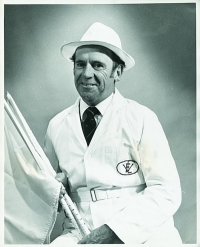Tom Rossiter
 To be present at an iconic moment in VFL history is a tremendous experience, to be at the centre of at least half a dozen indicates a truly remarkable career full of incident and excitement but also of excellence in maintaining form over an extended period. From ‘Gabbo’s run’ to Hopkin’s goal explosion to the Battle of Windy Hill ‘The Sheriff’ saw it all.
To be present at an iconic moment in VFL history is a tremendous experience, to be at the centre of at least half a dozen indicates a truly remarkable career full of incident and excitement but also of excellence in maintaining form over an extended period. From ‘Gabbo’s run’ to Hopkin’s goal explosion to the Battle of Windy Hill ‘The Sheriff’ saw it all.
Born Thomas Rossiter in St.Kilda on 12 August 1924 he grew up in grew up in East Malvern attending S.Mary’s Primary School and De La Salle College. He played football locally with Caulfied Juniors FC (Caulfield-Oakleigh FL) and East Malvern FC (East Suburban FL) before joining the RAAF as an 18 year old in September 1942.
Trained under the Empire Air Training Scheme as a wireless operator/air gunner he was assigned to RAF Bomber Command. Serving in 57 Squadron based in East Kirkby he and his Lancaster crew undertook 17 sorties over Germany before the end of the war.
On his return to Australia in November 1945 Tom resumed football this time playing for East Malvern RSL. A highlight of this time was when he represented the successful Victorian RSL side against SA in Adelaide in 1947.
Tom thought he would give umpiring a try and began with the VFL Reserve Grade as a field umpire in 1951. He felt he was progressing nicely in 1952 but after a run in with the Reserve Grade Advisor resulted in a finals appearance as a boundary umpire, Tom realised his career prospects were limited and gave away the whistle. His umpiring may have ended there but for the urging of a work colleague who encouraged him to come to the VFA as a goal umpire.
A two year stint at the Association led to three years back at the VFL Reserve Grade culminating with the 1959 Reserve Grade Grand Final and finally to the VFL senior list in 1960.
Debuting in round 2 at Punt Road with Essendon biggest win against Richmond (125 points) he was awarded Heritage Number 139 beginning one of the great goal umpiring careers.
A preliminary final in his second season was followed by the 1962 Grand Final the following year. It was in this period that Tom acquired the nickname ‘The Sheriff’.
“Roy Wright was responsible for that. He was commentating the last quarter of a game at Carlton and I had all the action. He noted to a fellow commentator ‘Have a look at this bloke, he’s quicker on the draw than Wyatt Earp’.” From then on Tom was ‘The Sheriff’.
Tom’s second Grand Final was the 1964 cliff-hanger between Melbourne and Collingwood. A ripping last quarter saw Neil Crompton goal to win the match for the Demons. Only minutes before Tom’s great moment in the game was signalling the Gabelich goal kicked after the Collingwood big man had run 65 metres from the flank to the goal line and encompassing four very clumsy bounces – a grand final classic.
If 1964 was close the 1970 Grand Final looked all over at half time with Collingwood up by 44 points but the whole game changed after half-time and Tom was in the middle of it. Carlton kicked to Tom’s end and with Ted Hopkins energising the forward line they kicked eight goals to three and narrowed the gap to seventeen points. The atmosphere was electric as 121 000 roared the players on. The Blues were ultimately successful by ten points yet this was not Tom’s most memorable match. That was reserved for the 1972 Grand Final.
In 2005 he recalled, “The 1972 Grand Final was the best game of VFL football ever played. It was unbelievable, the best I have ever seen. The ball was always in the hands of someone. There was no time for any nonsense. A magnificent game”. Given that 50 goals were scored it was no wonder there was no time for anything other than end to end football.
Fifty was a significant number two years later when Tom reached the compulsory age of retirement. It was also a year that saw him at Windy Hill on 18 May when a bench-clearing brawl broke out between players, team officials, trainers, spectators and police at half-time. Despite umpires laying no reports on the day, 35 players umpires and officials, including Tom, were interviewed and the result was four players and three officials were charged as a result of the investigation.
Tom’s final VFL match was the 1974 First-Semi final. It bought down then curtain on a remarkable goal umpiring career – 249 VFL matches (including ten finals and four Grand Finals), two interstate matches and 53 VCFL finals.
At the time it was believed that 249 constituted the VFL record for goal umpires. While this was not the case it was still an outstanding record and was compiled in an era when goal umpires started at older ages than the current era.
Three years as the VFL’s first Goal Umpires advisor followed retirement although he later contended that the system as set up in those days provided for little input and the “only compensation was a ticket to the football”.
In addition to his on-field success Tom was also a contributor to the VFLUA serving as an Executive Member from 1970-72. He was awarded Life Membership of the Association in 1970 and a Lifetime Achievement Award in 1974
Tom Rossiter passed away on 3 August 2011. Vale Sheriff.
Check out Tom’s work on-line
